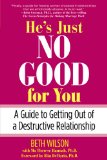
A Guide to Getting Out of a Destructive Relationship
Review posted March 8, 2010.
GPP Life (Globe Pequot Press), Guilford, Connecticut, 2009. 271 pages.
Destructive relationships make women small. They eclipse the vitality and expansiveness of our spirit, reducing the parameters of our world. They make us feel unworthy and "less-than," eventually leading to a hunger in our soul as we inhabit a relationship that doesn't nourish us. Instead of being as luminous and full as the feminine moon, we become too constricted to bring forth our light -- and may no longer feel the right to shine."
So begins Beth Wilson's book, designed to help women face unpleasant realities. First, she discusses the dynamics of a destructive relationship. They are hard to spot when you are in the middle of one, because we don't want to admit what's happening. She asks some questions that will help you evaluate if this applies to you.
She doesn't focus on obvious abuse, physical abuse and threats of violence:
This book is about the more subtle behaviors that, unchecked, systematically disintegrate a woman's vitality and self-confidence. Verbal abuse coupled with cruel behaviors are the main culprits we're focusing on.
Verbal abuse is tricky. Unless it's blatant -- threatening physical assault or direct character assassination -- it can be more likened to a razor blade than a machete. In the hands of an extremely skilled man, it can be a scalpel of control, with each incision creating a small but significant wound that must be perpetually mended in order for a woman to remain intact. And because these people want to avoid being labeled "abusive" -- and many of them have convinced themselves that they are not -- their first line of offense is to undermine, manipulate, confuse, invalidate, and dismantle a woman's sense of self, and her self-confidence. This they do very well. The more easily you can spot words and actions that undermine and invalidate you, the better off you'll be. This book will help you understand his maneuvers and sleight-of-hand tactics so you can make better sense of a crazy-making situation -- and see things for how they really are. It will help you learn how to differentiate between thoughtless words and actions and those devised to undo you.
After analyzing destructive relationships in their various forms, Beth Wilson helps you decide whether to stay or go, and if you go, helps you to plan when and how. Then she gives you advice for recovering and going on to live a better-than-normal life.
I could relate to the fantasies she described in the chapter on why people stay.
When it comes to destructive relationships, love is not enough. It can't fix our problems and it can't fix our problem person. But why should we let that stop us? We try to love harder, to be kinder, to be more understanding and more patient, often bending ourselves into elaborate contortions to take up the slack and, hopefully, achieve a more harmonious relationship. Unfortunately, all the qualities that define love prove to be futile instruments for change. More often than not, they simply add to our stress and make us more anxious to please in an effort to demonstrate our undying devotion. We overcompensate. Meanwhile, he keeps on doing what he's doing.
The truth is, none of us can force another person to change, not even if our intentions are noble. And though love can transform, when it comes to toxic men we can't love them strong enough or hard enough. We can't heal them and make them into someone better. We can't fill the holes in their heart and the pain of their childhood. Recommitting ourselves daily to be a better wife -- or a better girlfriend -- hoping to fill in the gaps so all will be well is simply unrealistic and, sadly, an exercise in futility.
Here's a book to help women face reality so they can make better decisions about how to act. This is a life-affirming book.

